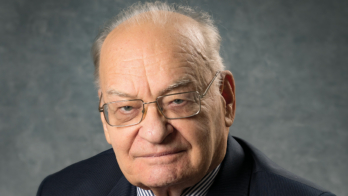One of the pioneers of silicon radiation detectors, Gerhard Lutz, passed away in Vienna on 28 April. He will be remembered for numerous inventions that shaped the field of silicon detectors, his deep insight into detector physics and analysis methods, his role as mentor of many young scientists, and his modest and charming personality.

Gerhard Lutz was born in Klagenfurt, Austria, in 1939. He studied physics at the Technical University of Vienna and obtained his PhD from the University of Hamburg under Willibald Jentschke, the founder of DESY and later a Director-General of CERN. His thesis concerned the coherent bremsstrahlung and pair production on diamond crystals using the DESY synchrotron, and demonstrated the production of GeV photons with a polarisation in excess of 70%. In 1967 he moved to Northeastern University in Boston and contributed to a spectrometer experiment at Brookhaven, which had aimed to follow up spectacular results reported earlier by the “CERN missing mass spectrometer”: the splitting of the A2 resonance and the observation of narrow high-mass resonances. Based on high-quality data and a painstaking analysis, he showed that the CERN results were incorrect.
In 1972, Lutz took a position at MPI-Munich and initiated a precision measurement of the reaction π– p(↑) → π– π+ n. He organised and ran the experiment, wrote the event-reconstruction software and developed the complex mathematical formalism necessary to interpret the results – marking a milestone in the understanding of exclusive hadronic reactions. In the late 1970s the CERN–Munich Group expanded into the ACCMOR collaboration, which pioneered the use of high-precision silicon tracking detectors. Together with Josef Kemmer and Robert Klanner, he developed silicon microstrip detectors using planar technology and built the vertex telescope for the CERN fixed-target experiments NA11 and NA32. The achieved precision of this device (5 μm), its ability to operate reliably in a high-intensity beam and identify charm particles against a huge background of hadronic events, unleashed the success story of silicon detectors. Today, practically all high-energy physics experiments rely on this technology.
Lutz’s contributions in the field of silicon detectors are numerous: the understanding of detector instabilities due to surface effects; the development of double-sided silicon-strip detectors; the concept of fully depleted pnCCDs based on the principle of sideway depletion; the realisation of novel concepts for silicon sensors with intrinsic gain; and the invention of the DePFET detector-amplifier structure. His developments found their way into many experiments outside particle physics, in particular in astrophysics and X-ray science, and also industry. Lutz co-founded the Max-Planck-Institut Halbleiterlabor (HLL) semiconductor laboratory in 1992, the research company PNSensor in 2002, and the instrumentation company PNDetector in 2007. Until the very end he contributed to the success of both companies with his sharp mind and inventions, while his guidance, inspiration and ideas have been essential for the success of semiconductor developers in the Munich area.
Those who had the opportunity to work with Gerhard Lutz appreciated his gentle and quiet way, his competence and deep insight. His scientific standards were very high and he detested superficial statements. His unconventional and original ideas inspired many colleagues and students, and his book Semiconductor Radiation Detectors has become a classic in the field. Gerhard Lutz’s innovative and influential work was honoured by the 1966 Röntgen Award, the 2011 Radiation Instrumentation Outstanding Achievement Award, and the 2017 High Energy Physics Prize of the European Physical Society (see “EPS awards prizes for high-energy physics”).





